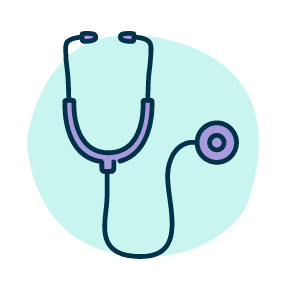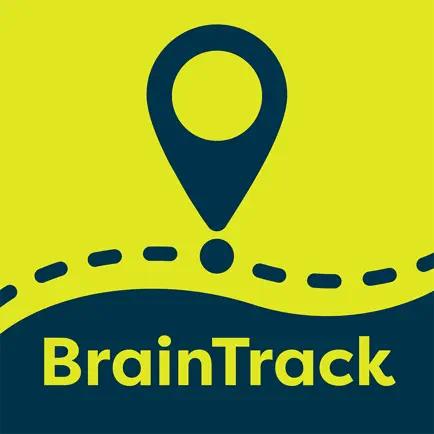Reduce your risk of dementia
Dementia isn’t inevitable. 45% of all dementia cases are avoidable: find out what you can do to reduce your risk of Alzheimer’s disease and other forms of dementia.
Is it possible to prevent dementia?
The latest research shows that globally, 45% of dementia cases can be prevented. But how?
There’s no single ‘magic wand’ solution to preventing Alzheimer’s disease and other forms of dementia. Instead, there are lots of little things you can do every day that add up to a big reduction in your dementia risk.
The things you can do reduce your risk fall into three categories. Select one below or scroll down for dementia prevention strategies you can make a start on today.
 Get regular health checks
Get regular health checksCheck-ups with health professionals tell you how your health is right now and how it’s changed over time.
 Look after your body
Look after your bodyTips on heart health, diet, hearing and vision, alcohol and smoking, sleep and head protection.
 Look after your mind
Look after your mindTips for social connection, keeping your mind active and taking care of your mental health.
Get regular health checks

Regular visits to your doctor to monitor your health are a great place to start with reducing your dementia risk. Check-ups tell you how your health is right now and how it’s changed since last time you saw your doctor.
The better you understand your health, the more you can do to take care of it. See your doctor and other health professionals for regular checks, including:
- blood pressure and cholesterol, especially if you have a family history of cardiovascular conditions
- blood glucose levels, especially if you have a family history of diabetes
- weight
- hearing and vision
- cognitive function and memory
- mood and mental health
- any other conditions that need regular medical attention.
Whatever the results, your treating health professional will be able to guide you in managing your health.
Look after your body and reduce dementia risk

It’s easy to think dementia prevention is all about your mind and brain. But your brain is part of your body, so taking good care of all of you helps reduce your dementia risk. Here are some ways of keeping your brain and body healthy.
Take care of your heart
Your heart health and brain health are connected. The more you do to take care of your heart, the better the result for your brain health, and it’s never too soon, or too late, to start.
There’s a lot you can do to improve your heart health, and the good news is, it doesn’t just reduce your risk of developing dementia. Taking care of your heart makes a big difference to your general health and wellbeing.
Here are some things you can do today to improve your heart health:
- be physically active
- reduce your alcohol consumption
- quit smoking
- make what you eat heart-healthy.
Change your diet for dementia prevention
What you eat affects every aspect of your health, including your brain health. If you eat well, you have a healthier heart, body and mind.
There’s a lot of information online about dementia-prevention diets, brain health supplements and specific foods to prevent Alzheimer’s disease and other forms of dementia. Some is supported by strong scientific research, some isn’t.
Three evidence-based diets are associated with brain-healthy foods and reducing your risk of dementia:
The Mediterranean diet
The Mediterranean diet combines ingredients and food practices from various southern European and northern African cultures, including fish, eggs, pulses, nuts and olive oil. It is linked to lower LDL cholesterol, lower risk of cardiovascular disease and diabetes, all of which are risk factors for developing dementia.
Read Harvard University’s review of the Mediterranean diet and learn how you can get started.
Watch our free video webinar on the Mediterranean diet, presented by dietitian Emma Butler.
The DASH diet
The DASH (Dietary Approaches to Stop Hypertension) diet includes fish, dairy, whole grains, nuts, beans and fish, and is designed for lowering high blood pressure (hypertension), although it is also linked with lower risk of cardiovascular disease and diabetes.
Read Harvard University’s review of the DASH diet and explore the Mayo Clinic’s collection of DASH diet recipes.
The MIND diet
The MIND (Mediterranean-DASH Diet Intervention for Neurodegenerative Delay) diet combines features of the Mediterranean and DASH diets and is designed specifically for protecting brain health and reducing neurocognitive decline. It includes brain-healthy foods rich in nutrients such as vitamins, carotenoids, and flavonoids.
The MIND diet targets brain health and dementia prevention, but because it is based on the Mediterranean and DASH diets, it’s also good for heart health, blood pressure, diabetes prevention, less depression and anxiety and maintaining a healthy weight, all of which are dementia risk factors.
The more you switch to a dementia prevention diet for brain health, the more the benefit. Even a little change helps.
Read Harvard University's review of the MIND diet and explore some MIND recipes.
Take care of your hearing
Hearing loss and dementia risk are linked: taking care of your hearing can help you reduce your chances of developing dementia.
The best way to protect your hearing is to prevent damage. You can do that by:
- avoiding loud noise
- wearing hearing protection
- quitting smoking
- having your hearing tested regularly.
Even with the best prevention, some level of hearing loss is common. If you or someone close to you notices problems with your hearing, talk to your doctor as soon as you can. They can test your hearing and refer you to a specialist to work out what’s going on. Early diagnosis and intervention can help improve your quality of life and reduce your risk of dementia.
Some hearing services can be subsidised by the Australian Government’s Hearing Services Program or private health insurance.
Watch our free video webinar on hearing loss and dementia, presented by Adult Specialist Audiologist Catherine Hart.
Take care of your eyesight
Losing some or all of your vision increases your risk of developing dementia if it goes untreated.
Talk to your doctor about your vision and get regular eye examinations. Early diagnosis and treatment are key to improving your quality of life and reducing your risk of dementia.
If you have glasses or contact lenses, wear them when you need them to reduce the strain on your eyes and brain.
Australia's National Equipment Database has a catalogue of aids for hearing and vision.
Reduce your alcohol, reduce your dementia risk
Excessive alcohol consumption is a risk factor for cognitive decline and dementia.
The Australian government's alcohol guidelines recommend:
- no more than ten standard drinks per week
- no more than four standard drinks in any one day
- at least two alcohol-free days per week.
It’s never too late to change. Every drink you don’t have helps.
Talk to your GP or the confidential National Alcohol and Other Drug Hotline if you’re drinking more than the recommended guidelines. Even if you’ve already been diagnosed with mild cognitive impairment, changing your habits can help. There is expert support for reducing your alcohol consumption that is respectful, private and sensitive.
Stop smoking, reduce your dementia risk
Smoking tobacco increases your risk of heart disease, stroke, cancer and dementia. There is no safe level of smoking, vaping or e-cigarette use.
There are many resources to help you quit, including nicotine replacement therapies, gums, patches or sprays. Get started by speaking with your doctor.
It’s never too late to stop smoking, and there are many great resources to help you quit. Get started today by calling Quitline or Aboriginal Quitline on 13 7848.
Illicit drugs and dementia risk
Any drug you take interferes with the way your brain works and can directly damage its structure and functioning. Over time, that can lead to permanent changes in the brain. It’s these changes that can raise your risk of developing dementia.
For more on the way drugs affect your brain and dementia risk, read our booklet Think Ahead.
For support with quitting, contact the confidential National Alcohol and Other Drug Hotline.
Get good sleep and protect your brain
Sleep plays a major role in brain health.
Good sleep helps you stay alert during the day and boosts your mood and thinking. It also helps you form and strengthen new memories and form new brain cells and may play a role in clearing harmful toxins from your brain.
Most adults work best on 7–8 hours of sleep a night, but that varies from person to person. It’s also about the quality of the sleep you get: deep, undisturbed, regular sleep is better for you than interrupted sleep.
It’s normal for the way you sleep to change as you get older. Many people need less sleep than they did before. But everyone needs sleep that is good for them.
There are a few reasons people don’t get good enough sleep, including:
- medical conditions
- depression or anxiety
- substance and medication use
- daily sleep habits that aren’t regular
- breathing problems.
If you get shallow or interrupted sleep, or have sleep apnoea, then over time, and without treatment, it can increase your risk of developing depression, cognitive problems and dementia.
However, with the right support, sleep disturbance can be managed.
Here are some ways you can work towards better sleep:
Establish a sleep schedule
Go to bed and get up at the same time every day to set your body clock.
Create a relaxing bedtime routine
Avoid alcohol and caffeine near bedtime, put away tech, dim the lights, stretch a little. You’ll teach your body to recognise when it’s time for sleep.
Maintain a good sleep environment
Your bed should be comfortable and not too hot or cold. Remove distractions like a TV, radio or phone.
Be smart about napping
Try to keep them to 30 minutes in the early afternoon.
Keep physically active
Physical activity helps regulate your body clock, feel sleepy, get deep sleep and reduce waking in the night.
Don’t force sleep
If you can’t fall asleep after a while, move to another area of the house. Sit quietly with no TV, computer, bright lights or snacks, and return to bed when you feel tired again.
Only use sleeping medications as a short-term solution
Follow the instructions on any medication you take for sleep. Avoid taking them for more than two weeks. Talk to your doctor about your options for better sleep.
If you’re not happy with the quality of your sleep, talk to your doctor. They will help you work out a way forward, so you can take care of your sleep, and take care of your brain.
Stay physically active
People who are physically active throughout their lives, particularly from age 65 on, are less likely to develop dementia.
Physical exercise gets your heart pumping and makes it stronger. Try to get 30 minutes of moderate-intensity physical activity at least five days a week.
Exercise helps keep your brain healthy and improves your memory and thinking by:
- supporting blood flow and oxygen supply to your brain
- stimulating the growth of new brain cells
- protecting brain functioning in later life
- helping reduce your risk of falls
- keeping you social and engaged with other people.
Being active is also good for your heart, sleep and mood, and reduces your risk of high blood pressure, heart disease, stroke, type 2 diabetes and obesity.
Not everyone is able to get lots of high-intensity exercise, but every bit helps.
There are three kinds of exercise that can help:
Aerobic exercise
Gets your heart pumping. You can start off small and build with this: try getting 30 minutes of brisk walking, dancing, jogging, bicycling or swimming. You should feel a little out of breath, but not much more.
Resistance or weight training
Works your muscles, but it’s also great for your tendons, bones, metabolic rate and posture. Again, start small: squeeze a rubber ball, use an elastic resistance band from a sports shop or lift light weights.
Flexibility and balance exercises
Strengthen your spine’s supporting muscles and improve your coordination and balance. You can add these to your other exercise: try stretching, tai chi, yoga and Pilates.
Doing a mix of these exercises, for at least 30 minutes a day, is a terrific way to feel better and protect your brain health. If 30 minutes is too much at first, that’s okay: treat it as a goal and get there at your own speed.
Getting started is often the hardest part. Try different things, and pick the ones you enjoy most to keep up. Join a group or exercise alone, whatever works for you.
You can also build activity into your everyday life: try walking to the shops instead of driving, or getting off the bus a few stops earlier and walking the rest of the way.
Talk to your doctor before starting an exercise program, especially if you have a health condition or disability, or if it’s been a long time since you've exercised. They can help you find the type and intensity of exercise best suited to you.
Protect your head
Having repeated knocks to your head over time can lead to a condition called chronic traumatic encephalopathy (CTE).
This doesn’t mean you will definitely develop dementia if you’ve had head injuries. It just means your risk is higher.
The best way to reduce your risk of CTE dementia is to protect your head and avoid injury. Here are some tips:
- Wear a helmet and safety gear when you play sport, skate, or ride a bike, scooter or motorbike.
- Wear a seat belt when travelling in any vehicle.
- Obey road rules, including not driving after using drugs or alcohol.
- Minimise your risk of trips or falls inside and outside the home.
- Take extra care on slippery surfaces, stairs and ladders.
- Install and use handrails around stairs or in your bathroom.
- Secure rugs, carpets and loose electrical cords to reduce your chance of tripping.
- Use a walker or cane if you feel unsteady on your feet.
- Watch for pets or young children who might get under your feet while walking.
Look after your mind and reduce dementia risk
Human minds need stimulation to stay healthy. The more active and challenged your mind is, the better your chances are of preventing Alzheimer’s disease and other forms of dementia. Here are some ways to take care of your mental health, stay active and reduce your risk of dementia.
Stay socially connected for dementia prevention
A good social life helps us feel like we belong, like we’re connected to the world around us. That feeling of connection is protective: loneliness and depression are linked to a higher risk of cognitive decline.
There are times in everyone’s life when there’s a risk of losing social contact. Moving house or town, the end of relationships, losing someone close and retirement can all create a break in your social life. It can be hard to keep social connection going, but there are options.
Everyone’s social needs are different. Some people like a busy social life, others just need a little quality social time now and then.
Here are some suggestions for making and maintaining social connection:
- catching up with friends or family over the phone or in-person
- joining a group activity through your local council, art gallery or museum
- joining organisations like your local Men’s Shed or Volunteering Australia
- joining an exercise or sports club
- having friendly chats with shopkeepers or people you encounter throughout the day.
Exercise your mind and strengthen your brain
Just like your body, your mind gets stronger when it works out.
We used to think that ‘you can’t teach an old dog new tricks’. However, research shows that the brain can adapt and change at all life stages, even in later life.
Mental exercise helps to build new brain cells and strengthen connections between them. This helps to give your brain more ‘reserve’ or ‘back up’ so that it can cope better and keep working properly if any brain cells are damaged or die.
There’s no guarantee that mental exercise will prevent dementia, but it will keep your mind and brain in their best condition as you get older.
Mental exercise means giving your mind a mix of interesting, challenging, fun things to do. That’s different for everyone, but here are a few suggestions:
- reading
- crosswords, and other puzzles and games
- painting
- sewing, woodwork and other crafts
- cooking
- playing an instrument
- taking a course
- learning a language.
Only you know what will work for you. Just trying new things is good for your brain, so if you get a little out of your comfort zone, you’re already making a good start.
Take care of your mental health
Feeling sad or down is normal and not an illness. But if you feel sad, low or down for a long time, and you stop enjoying things like you used to, it can start to interfere with your work and relationships and get in the way of you living your life. It’s like your mind has got stuck in this low state — a depressive illness.
If you feel like this, talk to your doctor. Depression is one of the most common mental conditions in the world, and like any illness, depression can be treated.
Your doctor is the best place to start. They can help you understand what’s happening, give you an initial diagnosis, and start some treatments to help. They may also work with you on a mental health care plan, prescribe appropriate medicine and refer you to a therapist for subsidised therapy sessions.
Everyone’s needs are unique, but with the right support, you can find the best treatment for you, take care of your mental health and reduce your risk of dementia.
If you’re struggling with your mental health right now, you can call:
- Lifeline 13 11 14, any time
- MensLine Australia 1300 789 978
- Kids Helpline 1800 55 1800
- 13 YARN 13 92 76 any time, for Aboriginal and Torres Strait Islander people
- QLife (LGBTIQ+) 1800 184 527
- Women's Wellbeing Line 1800 496 636 (Queensland only)
Call 000 if anyone’s life or safety is in immediate danger.
Webinar: Reducing Dementia Risk
In this free dementia expert webinar, Dr Marita Long, Dementia Australia Honorary Advisor and practising GP, discusses changes in thinking and how to monitor them, as well as dementia risk factors and strategies that can help to reduce them.
You will learn about:
- changes in cognition and steps to take if concerned
- risk factors associated with dementia
- strategies and modifiable risk factors to reduce risk of dementia.


Know your dementia risk factors
Learning the 14 modifiable risk factors for dementia puts you in a position to make all the changes you can to keep your brain healthy and lower your dementia risk.
 BrainTrack
BrainTrackAre you concerned about changes in your thinking or memory? Games and challenges on this new app give you data you can share with your GP.
 Early warning signs
Early warning signsLearn the most common early signs and symptoms of dementia, how to notice them, and what you can do if they happen to you.
 The sooner you know, the more you can do
The sooner you know, the more you can doIf you or a loved one have concerns about changes to memory, mood or thinking, there is support and information to help you.
All content published on Dementia Australia’s websites is for information purposes only and does not constitute medical, legal or financial advice. Talk to a qualified professional. Dementia Australia does not accept liability for any injury, loss or damage caused by use of the information on this website.




